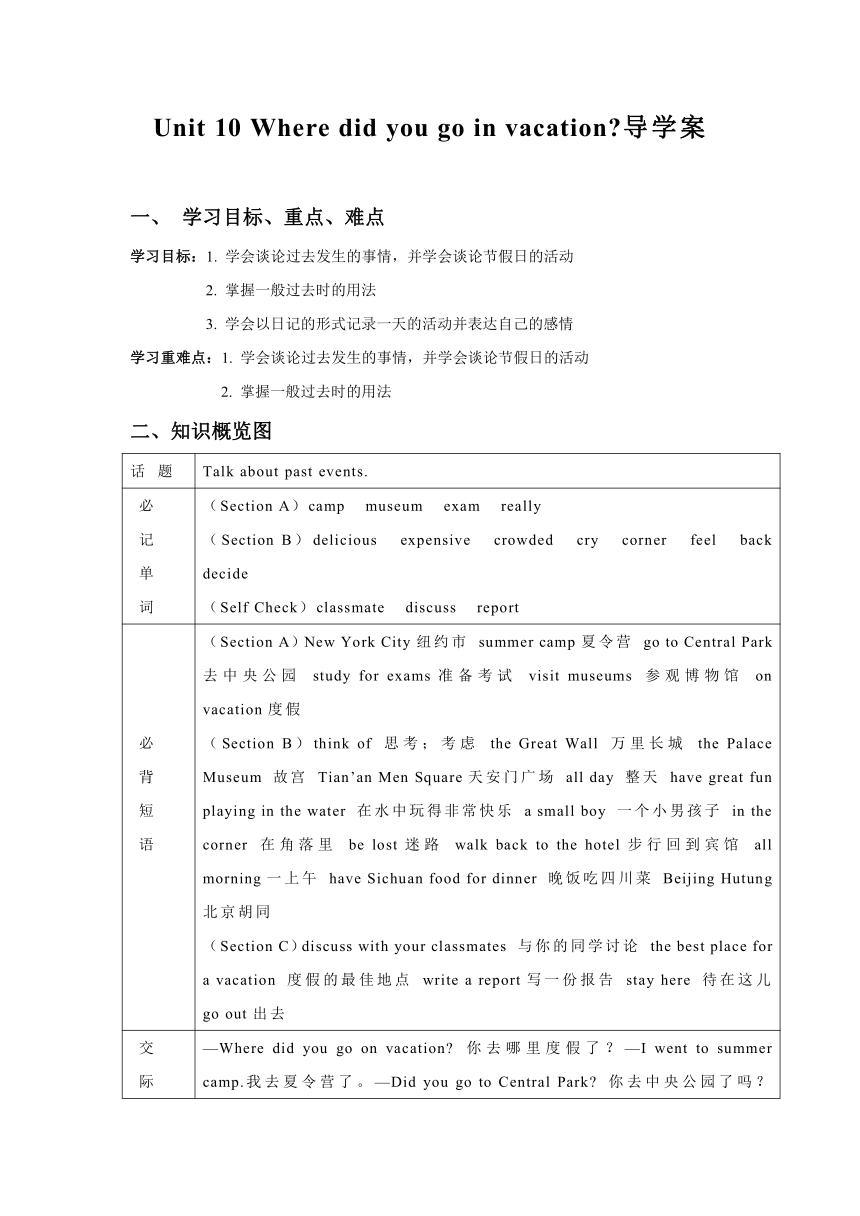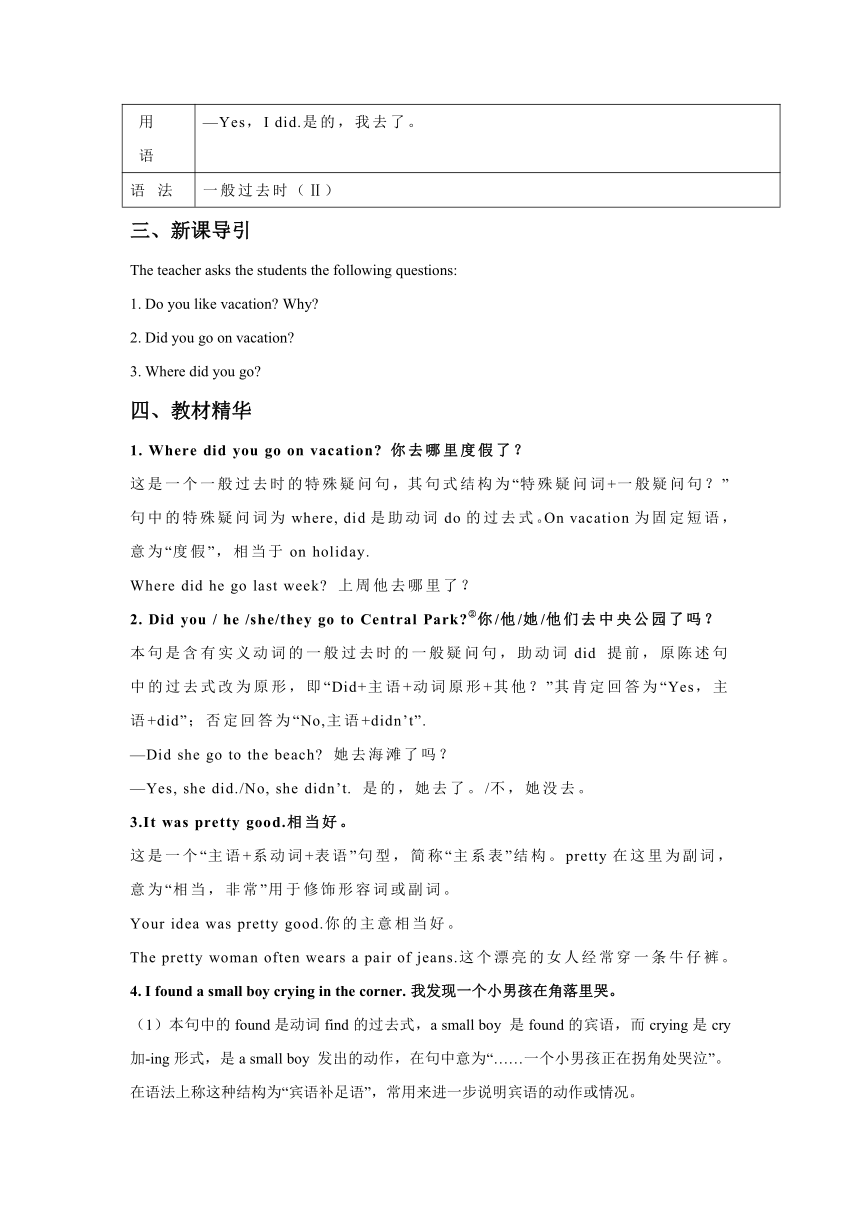Unit 10 Where did you go in vacation导学案
文档属性
| 名称 | Unit 10 Where did you go in vacation导学案 |

|
|
| 格式 | zip | ||
| 文件大小 | 15.5KB | ||
| 资源类型 | 教案 | ||
| 版本资源 | 人教新目标(Go for it)版 | ||
| 科目 | 英语 | ||
| 更新时间 | 2012-02-14 00:00:00 | ||
图片预览


文档简介
Unit 10 Where did you go in vacation 导学案
学习目标、重点、难点
学习目标:1. 学会谈论过去发生的事情,并学会谈论节假日的活动
2. 掌握一般过去时的用法
3. 学会以日记的形式记录一天的活动并表达自己的感情
学习重难点:1. 学会谈论过去发生的事情,并学会谈论节假日的活动
2. 掌握一般过去时的用法
二、知识概览图
话 题 Talk about past events.
必记单词 (Section A)camp museum exam really(Section B)delicious expensive crowded cry corner feel back decide(Self Check)classmate discuss report
必背短语 (Section A)New York City纽约市 summer camp夏令营 go to Central Park 去中央公园 study for exams准备考试 visit museums 参观博物馆 on vacation度假(Section B)think of 思考;考虑 the Great Wall 万里长城 the Palace Museum 故宫 Tian’an Men Square天安门广场 all day 整天 have great fun playing in the water 在水中玩得非常快乐 a small boy 一个小男孩子 in the corner 在角落里 be lost迷路 walk back to the hotel步行回到宾馆 all morning一上午 have Sichuan food for dinner 晚饭吃四川菜 Beijing Hutung北京胡同(Section C)discuss with your classmates 与你的同学讨论 the best place for a vacation 度假的最佳地点 write a report写一份报告 stay here 待在这儿 go out出去
交际用语 —Where did you go on vacation 你去哪里度假了?—I went to summer camp.我去夏令营了。—Did you go to Central Park 你去中央公园了吗?—Yes,I did.是的,我去了。
语 法 一般过去时(Ⅱ)
三、新课导引
The teacher asks the students the following questions:
1. Do you like vacation Why
2. Did you go on vacation
3. Where did you go
四、教材精华
1. Where did you go on vacation 你去哪里度假了?
这是一个一般过去时的特殊疑问句,其句式结构为“特殊疑问词+一般疑问句?”句中的特殊疑问词为where, did是助动词do的过去式。On vacation为固定短语,意为“度假”,相当于on holiday.
Where did he go last week 上周他去哪里了?
2. Did you / he /she/they go to Central Park ②你/他/她/他们去中央公园了吗?
本句是含有实义动词的一般过去时的一般疑问句,助动词did 提前,原陈述句中的过去式改为原形,即“Did+主语+动词原形+其他?”其肯定回答为“Yes,主语+did”;否定回答为“No,主语+didn’t”.
—Did she go to the beach 她去海滩了吗?
—Yes, she did./No, she didn’t. 是的,她去了。/不,她没去。
3.It was pretty good.相当好。
这是一个“主语+系动词+表语”句型,简称“主系表”结构。pretty在这里为副词,意为“相当,非常”用于修饰形容词或副词。
Your idea was pretty good.你的主意相当好。
The pretty woman often wears a pair of jeans.这个漂亮的女人经常穿一条牛仔裤。
4. I found a small boy crying in the corner. 我发现一个小男孩在角落里哭。
(1)本句中的found是动词find的过去式,a small boy 是found的宾语,而crying是cry加-ing形式,是a small boy 发出的动作,在句中意为“……一个小男孩正在拐角处哭泣”。在语法上称这种结构为“宾语补足语”,常用来进一步说明宾语的动作或情况。
(2)find sb doing sth 意为“发现某人正在做某事”,强调动作正在发生,而find sb do sth意为“发现某人做某事”,强调发现的是动作的全过程。
I found my kid brother reading a book under a tree.我发现我的小弟弟在一棵树下看书。
He found a man cross the road. 他发现一个男人穿过了马路。
五、语法技巧
一般过去时(Ⅱ)
1.实义动词的过去式除特殊动词外,一般在动词原形词尾加-ed构成,没有人称和数的变化。它的一般疑问句和否定句往往借助于助动词did构成。谓语动词要恢复原形。
He watched TV last night.昨天晚上他看电视了。
—Did he watch TV last night 昨天晚上他看电视了吗?
—Yes, he did./No, he didn’t.是的,他看了。/不,他没看。
He didn’t watch TV last night. 昨天晚上他没看电视。
2.规则动词过去式的构成:
(1)一般在动词后加-ed.
look→ looked
(2)以e结尾的动词,直接在词尾加-ed。
like→ liked
(3)重读闭音节续尾且末尾只有一个辅音字母的动词,先双写这个辅音字母,再加-ed。
stop→ stopped
(4)以“辅音字母+y”结尾的动词,先变y为i,再加-ed。
study→ studied
六、课堂检测
Ⅰ.用所给词的适当形式填空
1. She asked me to go ______(camp)with her.
2. I was ______(real)tired after a long walk.
3.She ________ (have) an exciting party last weekend.
4.She ________ (not visit)her aunt last weekend.
5.Jim ________ (study) for the math test last night.
II.根据汉语提示完成句子
1. The food is very (美味的).
2. The car is too (昂贵的).
3. I didn’t want this (便宜的) coat.
4. She (哭泣) and told me that she was wrong.
5. The stores were too (拥挤的).
III.句型转换
1.We went to Now York City on vacation. (对画线部分提问)
__________________________________________
2.The beaches were fantastic. (对画线部分提问)
__________________________________________
3. She went to the Central Park. (改为一般疑问句并作肯定及否定回答)
__________________________________________________________
4. Tom did his homework last night.(改不否定句)
Tom ________ ________ his homework last night.
5. Mary often watches TV.(用last Sunday改写句子)
Mary ________ ________ last Sunday.
IV.单项填空
1. It was a fine day. We decided volleyball.
A. to play B. play C. playing D. played
2. There is a big supermarket the street corner.
A. at B. for D. behind D. over
3. We were in Qingdao last week and great fun there.
A. will B. have had C. had D. have
4. Colors can our moods and make us happy or sad, energetic or sleepy.
A. to feel B. feeling C. felt D. feel
5. They found the missing boy near the river just now.
A. playing B. to be playing C. plays D. to play
七、体验中考
1.(2010·龙岩)—How long ________ it ________ you to work out such a difficult problem
—About thirty minutes.
A. did, take B. does, take C. did, cost
2.(2010·河北)I ______ a mistake, Please don’t be angry with me.
A. make B. made C. has been D. will be
八、学后反思
学习目标、重点、难点
学习目标:1. 学会谈论过去发生的事情,并学会谈论节假日的活动
2. 掌握一般过去时的用法
3. 学会以日记的形式记录一天的活动并表达自己的感情
学习重难点:1. 学会谈论过去发生的事情,并学会谈论节假日的活动
2. 掌握一般过去时的用法
二、知识概览图
话 题 Talk about past events.
必记单词 (Section A)camp museum exam really(Section B)delicious expensive crowded cry corner feel back decide(Self Check)classmate discuss report
必背短语 (Section A)New York City纽约市 summer camp夏令营 go to Central Park 去中央公园 study for exams准备考试 visit museums 参观博物馆 on vacation度假(Section B)think of 思考;考虑 the Great Wall 万里长城 the Palace Museum 故宫 Tian’an Men Square天安门广场 all day 整天 have great fun playing in the water 在水中玩得非常快乐 a small boy 一个小男孩子 in the corner 在角落里 be lost迷路 walk back to the hotel步行回到宾馆 all morning一上午 have Sichuan food for dinner 晚饭吃四川菜 Beijing Hutung北京胡同(Section C)discuss with your classmates 与你的同学讨论 the best place for a vacation 度假的最佳地点 write a report写一份报告 stay here 待在这儿 go out出去
交际用语 —Where did you go on vacation 你去哪里度假了?—I went to summer camp.我去夏令营了。—Did you go to Central Park 你去中央公园了吗?—Yes,I did.是的,我去了。
语 法 一般过去时(Ⅱ)
三、新课导引
The teacher asks the students the following questions:
1. Do you like vacation Why
2. Did you go on vacation
3. Where did you go
四、教材精华
1. Where did you go on vacation 你去哪里度假了?
这是一个一般过去时的特殊疑问句,其句式结构为“特殊疑问词+一般疑问句?”句中的特殊疑问词为where, did是助动词do的过去式。On vacation为固定短语,意为“度假”,相当于on holiday.
Where did he go last week 上周他去哪里了?
2. Did you / he /she/they go to Central Park ②你/他/她/他们去中央公园了吗?
本句是含有实义动词的一般过去时的一般疑问句,助动词did 提前,原陈述句中的过去式改为原形,即“Did+主语+动词原形+其他?”其肯定回答为“Yes,主语+did”;否定回答为“No,主语+didn’t”.
—Did she go to the beach 她去海滩了吗?
—Yes, she did./No, she didn’t. 是的,她去了。/不,她没去。
3.It was pretty good.相当好。
这是一个“主语+系动词+表语”句型,简称“主系表”结构。pretty在这里为副词,意为“相当,非常”用于修饰形容词或副词。
Your idea was pretty good.你的主意相当好。
The pretty woman often wears a pair of jeans.这个漂亮的女人经常穿一条牛仔裤。
4. I found a small boy crying in the corner. 我发现一个小男孩在角落里哭。
(1)本句中的found是动词find的过去式,a small boy 是found的宾语,而crying是cry加-ing形式,是a small boy 发出的动作,在句中意为“……一个小男孩正在拐角处哭泣”。在语法上称这种结构为“宾语补足语”,常用来进一步说明宾语的动作或情况。
(2)find sb doing sth 意为“发现某人正在做某事”,强调动作正在发生,而find sb do sth意为“发现某人做某事”,强调发现的是动作的全过程。
I found my kid brother reading a book under a tree.我发现我的小弟弟在一棵树下看书。
He found a man cross the road. 他发现一个男人穿过了马路。
五、语法技巧
一般过去时(Ⅱ)
1.实义动词的过去式除特殊动词外,一般在动词原形词尾加-ed构成,没有人称和数的变化。它的一般疑问句和否定句往往借助于助动词did构成。谓语动词要恢复原形。
He watched TV last night.昨天晚上他看电视了。
—Did he watch TV last night 昨天晚上他看电视了吗?
—Yes, he did./No, he didn’t.是的,他看了。/不,他没看。
He didn’t watch TV last night. 昨天晚上他没看电视。
2.规则动词过去式的构成:
(1)一般在动词后加-ed.
look→ looked
(2)以e结尾的动词,直接在词尾加-ed。
like→ liked
(3)重读闭音节续尾且末尾只有一个辅音字母的动词,先双写这个辅音字母,再加-ed。
stop→ stopped
(4)以“辅音字母+y”结尾的动词,先变y为i,再加-ed。
study→ studied
六、课堂检测
Ⅰ.用所给词的适当形式填空
1. She asked me to go ______(camp)with her.
2. I was ______(real)tired after a long walk.
3.She ________ (have) an exciting party last weekend.
4.She ________ (not visit)her aunt last weekend.
5.Jim ________ (study) for the math test last night.
II.根据汉语提示完成句子
1. The food is very (美味的).
2. The car is too (昂贵的).
3. I didn’t want this (便宜的) coat.
4. She (哭泣) and told me that she was wrong.
5. The stores were too (拥挤的).
III.句型转换
1.We went to Now York City on vacation. (对画线部分提问)
__________________________________________
2.The beaches were fantastic. (对画线部分提问)
__________________________________________
3. She went to the Central Park. (改为一般疑问句并作肯定及否定回答)
__________________________________________________________
4. Tom did his homework last night.(改不否定句)
Tom ________ ________ his homework last night.
5. Mary often watches TV.(用last Sunday改写句子)
Mary ________ ________ last Sunday.
IV.单项填空
1. It was a fine day. We decided volleyball.
A. to play B. play C. playing D. played
2. There is a big supermarket the street corner.
A. at B. for D. behind D. over
3. We were in Qingdao last week and great fun there.
A. will B. have had C. had D. have
4. Colors can our moods and make us happy or sad, energetic or sleepy.
A. to feel B. feeling C. felt D. feel
5. They found the missing boy near the river just now.
A. playing B. to be playing C. plays D. to play
七、体验中考
1.(2010·龙岩)—How long ________ it ________ you to work out such a difficult problem
—About thirty minutes.
A. did, take B. does, take C. did, cost
2.(2010·河北)I ______ a mistake, Please don’t be angry with me.
A. make B. made C. has been D. will be
八、学后反思
同课章节目录
- Unit 1 Where did you go on vacation?
- Section A
- Section B
- Unit 2 How often do you exercise?
- Section A
- Section B
- Unit 3 I'm more outgoing than my sister.
- Section A
- Section B
- Unit 4 What's the best movie theater?
- Section A
- Section B
- Unit 5 Do you want to watch a game show?
- Section A
- Section B
- Unit 6 I'm going to study computer science.
- Section A
- Section B
- Unit 7 Will people have robots?
- Section A
- Section B
- Unit 8 How do you make a banana milk shake?
- Section A
- Section B
- Unit 9 Can you come to my party?
- Section A
- Section B
- Unit 10 If you go to the party, you'll have a grea
- Section A
- Section B
